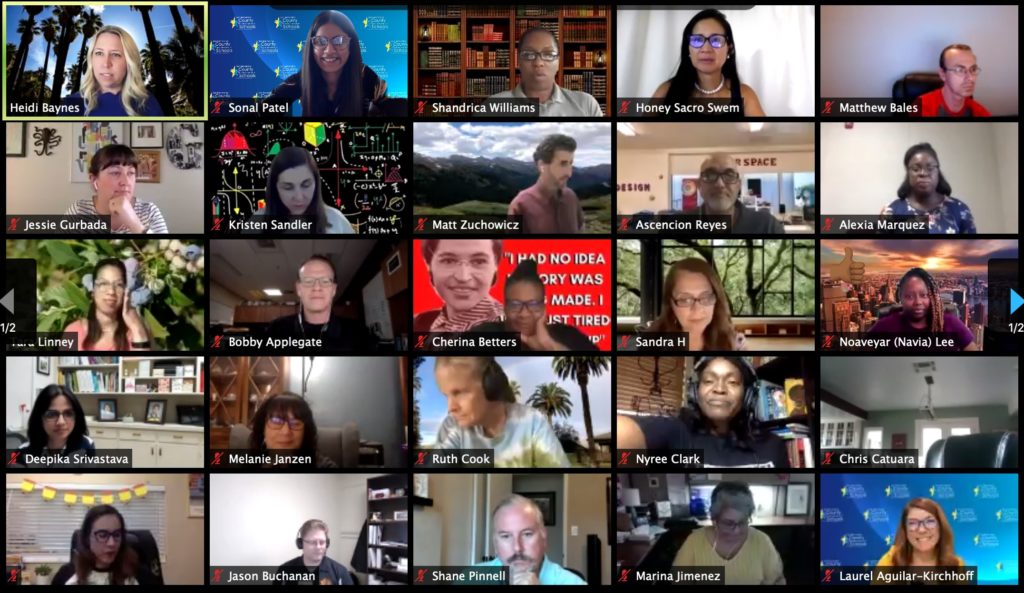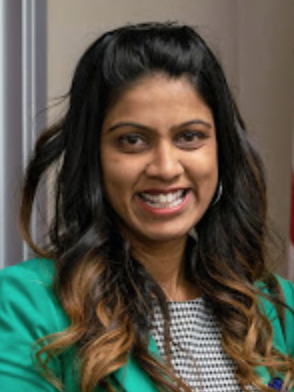Great things can happen in computer science education when we work together—across school districts and disciplines.
Sonal Patel is the Coordinator of Digital Learning Innovation at San Bernardino County Superintendent of Schools (SBCSS) and together with Heidi Baynes, EdTech Coordinator Riverside County Office of Education (RCOE), they formed the CS Equity Task Force. Made up of a diverse group of stakeholders from a variety of backgrounds, their focus is on increasing access to computer science education for K-12 students in the Inland Empire.
We met with them to talk about how they got started, what they’re working on, and advice for others interested in getting involved.
Sonal & Heidi: The CS Equity Task Force represents a vision in which all K-12 students within the Inland Empire have access to computer science education. This involves meaningful discussions around equity in computer science, strategies and ideas to develop computer science professional learning, and systemic changes needed to provide rigorous and inclusive CS education.

The Task Force began when SBCSS held a series of meetings to create a vision for our county-wide effort to expand computer science. In those meetings we centered discussions around the CS Equity Guide, and through this we built our own awareness of CS equity, and shared our own perspectives of what could potentially impact a more equitable CS education.
The next year SBCSS partnered with Riverside County, who are continuously leading reform efforts in computer science with the UCLA research-practice-partnership called SCALE-CA. We held a meeting open to any education stakeholder from either of the two counties who was interested in this work. We’re making deliberate efforts to reach people from diverse backgrounds with a passion for equity in computer science.
Sonal: Despite the considerable and growing need for computer science skills in today's workforce, girls, Black, Hispanic, Native American and Alaskan students, as well as students with disabilities, and students from low-income households face substantial barriers to this career path. It has become apparent that K–12 schools fail to offer meaningful computer science courses. If they provide it, underrepresented students are either not choosing to do it or dropping out of CS courses.

The book 'Stuck in the Shallow End' by Jane Margolis offered a perspective I hadn’t considered before reading about it. Inclusive CS matters. It matters to females who are discouraged against taking CS. It matters to Black and Hispanic students who don't experience a culturally responsive CS education. It matters to students from low-income backgrounds who lack access to rigorous and engaging computer science courses. It also matters to students with disabilities who struggle to access curricula that aren't universally designed. Today's technological advancements are calling for a diversity of perspectives, skills, and creative approaches to our world's innovations and creations. We need equity-driven and barrier-free computer science pathways at the primary and secondary levels.
California's diversity does not represent what we see in CS. As a woman of color, who grew up under-privileged, I am extremely invested in doing this work to help change the CS access trajectory. I am so grateful that Heidi has partnered with me to make this dream a reality. I'm even more thankful for the perspectives of the individuals that are a part of the Computer Science Equity Task Force.
Heidi: Computer science controls every aspect of our modern world. Students can currently complete their entire K-12 education with no exposure to computer science principles. The one topic that permeates the lives of our students and affects every field of study and occupation should be—at the very least—available to every student to study, whether specifically or integrated into the general curriculum. We need the voices and perspectives of all students in computer science because they represent our diverse world and the needs of all people. All students should feel like they belong in a computer science class and we need to do more to recruit students who traditionally have been overlooked in the CS educational world.
Sonal: When I started at the County Office, one of my assigned responsibilities was to work on a plan to integrate computer science education into K-12 settings. I wasn't thrilled about it at first, and to be honest, I was a little nervous about it because other than being exposed to coding through events like Hour of Code, CUE, and ISTE, I didn't truly understand the core concepts of computer science.
That's when I decided I needed to build my capacity in this area of work. Fortunately, I found a National Science Foundation-funded Teacher Education program at the University of Irvine, applied and got accepted along with a diverse group of educators throughout the Orange County and Los Angeles region. Nancy Se, a computer science teacher from Los Angeles County, taught the first module centered around equity in computer science. Our first reading assignment was Stuck in the Shallow End, and I was blown away by the powerful inequities uncovered by their study. Combined with research and data exploration that showed the gaps in computer science, I had this strong urge to take action. I then went on to apply for the Google Innovator Program. I got accepted into the program with the problem, "How do we remove barriers to access for students to participate in computer science education?". My project for the innovator program had evolved into this Computer Science Equity Task Force.

Heidi: The Hour of Code was my introduction to CS education—unless you count my Apple IIe in the 80s! The excitement and engagement of the students was palpable and I wanted to learn more. Experience with Scratch led me to apply for training through the Raspberry Pi Foundation’s Picademy program. The ability to control the physical world with programming was fascinating to me and I wanted to bring the opportunity to as many students as possible.
Sonal & Heidi: On a month to month basis, our CS Equity Task Force meets to work on activities centered around our vision for the expansion of K-12 computer science access and opportunities.
Sonal & Heidi: We have a wonderfully committed and diverse group of stakeholders that want to bring more opportunity to their students, and we're grateful for their work and perspectives in expanding computer science offerings throughout their districts and local education agencies (LEAs). It is worth noting that the people in this group are not necessarily CS teachers. We have administrators, counselors, educators, and library-media specialists. We are hoping to have some parent leaders attend the next meeting - a stakeholder group we are excited to include.
Heidi: Start small. Find a few key people that are willing to meet and discuss the issues. When Sonal started the group she reached out to people that represented a variety of different stakeholders not necessarily involved in computer science. I found that to be a brilliant idea. If we want to expand computer science education, we need to include people who aren’t already involved in the discussion. That’s the key.
Sonal: Seek people who care about equity, diversity and inclusion work in K-12 education. Computer science can sound scary. We do not want to deter anyone from taking action, simply because they don’t have CS background or experience. We want to reach people from all stakeholder groups, regardless of their backgrounds and experience in CS. The most important thing to do here is to work together, collaboratively, to solve this massive computer science problem and expand CS opportunities and access to all students, not just one classroom or school, but a greater effort to increase access across California.
Please know that our doors are always open for guests to attend these meetings and learn more about this project. We still have a long way to go, but having people to collaborate with that can bring in the varying perspectives, will ultimately guide us to create a long-standing plan for our counties.
Sonal & Heidi: We would like to see parent leaders join some of our upcoming conversations.
We are looking forward to having experts, researchers and community partners talk with the group in future meetings. This will ultimately help us ensure that every stakeholder voice is heard.
By the end of this year we want to create a thoughtful action-oriented approach to expanding CS access and opportunities to all. This may also involve some action research and purposeful data collection to highlight the real problems.
What we did here was create a model that is working for us. We are excited about the future and the changes we will see throughout our two counties. If anyone has any questions and would like to reach out to learn more about the Computer Science Equity Task Force, please don’t hesitate to contact us.
Sonal & Heidi: The CS Equity Task Force started small with 15 people. It was a collaborative effort with colleagues Laurel Kirchhoff (Digital Learning Project Specialist at SBCSS and Melanie Janzen (Math Coordinator at SBCSS).
Special thanks to the original members—their work was pivotal to the start and growth of this group of stakeholders who were selected based on their vision for equity in education (not their computer science knowledge):